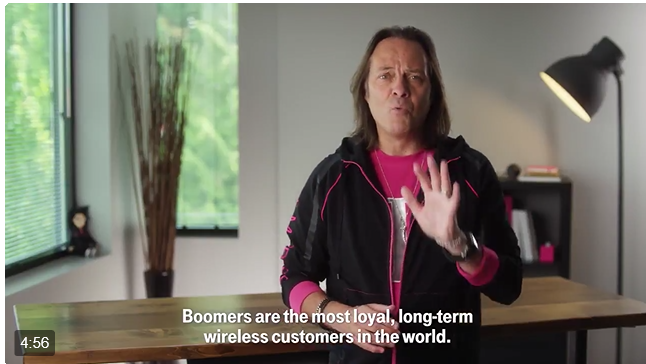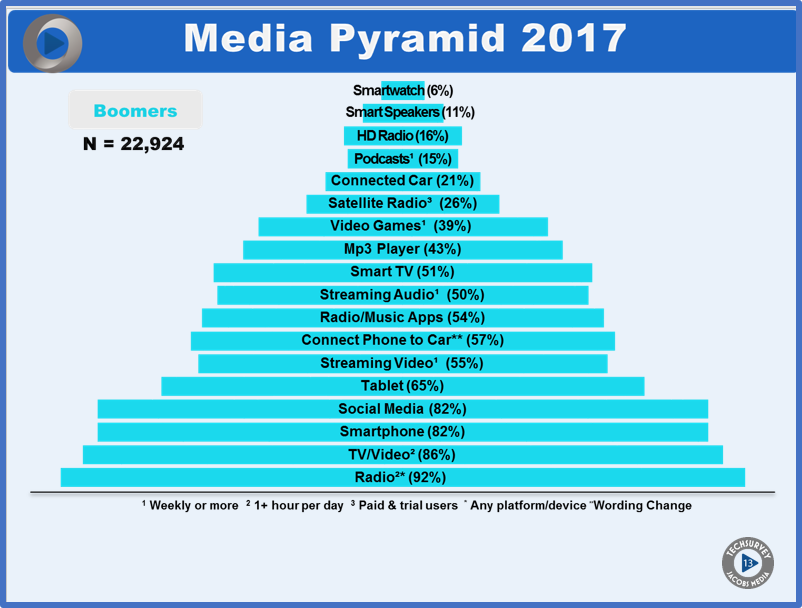 Regular readers of this blog know a recurring theme is the efficacy of Baby Boomers – those born between 1946-1964 – as a viable, marketable generation. A little math reveals that Boomers now fall between the ages of 53 and 71. And that leaves this massive generation almost completely beyond the parameters of what is described in radio advertising circles as “the sweet spot.”
Regular readers of this blog know a recurring theme is the efficacy of Baby Boomers – those born between 1946-1964 – as a viable, marketable generation. A little math reveals that Boomers now fall between the ages of 53 and 71. And that leaves this massive generation almost completely beyond the parameters of what is described in radio advertising circles as “the sweet spot.”
25-54 year-old adults
For just about every radio station in America, it’s the only demo that matters. That, in spite of the fact there are roughly 75 million Boomers in the U.S., second only to those pesky Millennials in size. And despite robust statistics that clearly show these aging Woodstock Era consumers spend an estimated $2 trillion (yes, with a “T”) annually, they have rapidly become pariahs in most radio strategic research sessions. No one even includes 55-59 year-olds in audience survey for fear of steering a station right smack into the phenomenon of “aging out.”
The much-discussed “demographic cliff” is a stark warning for any format whose demographics start drifting too far northward – a condition that has already claimed Oldies and Jazz, while threatening the future of News/Talk and Classic Rock.
And yet, Boomers continue to be rack up impressive tech numbers. In Techsurvey13, our “Boomer Pyramid” reveals a mature generation ensconced in gadgets, social media, and new platforms.
 More than eight in ten own a smartphone and have a profile on popular sites like Facebook, Twitter, and LinkedIn. More than half stream video at least weekly, and a majority now owns a connected TV. Four in ten regularly play video games, while more than half have downloaded a radio or music-centric app.
More than eight in ten own a smartphone and have a profile on popular sites like Facebook, Twitter, and LinkedIn. More than half stream video at least weekly, and a majority now owns a connected TV. Four in ten regularly play video games, while more than half have downloaded a radio or music-centric app.
They’re Facetiming with grandkids, posting photos on Instagram, and watching TV on-demand on Netflix. As the president of Brand Keys, Robert Passikoff, told the New York Times’ Janet Morrissey, “This group is the forgotten generation.”
That’s remarkable when you consider how many of the most influential people on the planet are Boomers. Bill Clinton, Oprah, George Clooney, and Meryl Streep – yup, they’re all card carrying Boomers (and probably members of AARP). And yet, advertisers and brand managers can’t run away from them fast enough, as we know all too well in radio.
But now, a respected corporate executive and ace marketer, T-Mobile CEO John Legere, is once again flying in the face of conventional wisdom by aggressively marketing his services to people who share their chronology with Julius Erving and Sally Field.
Legere has made some pretty unconventional marketing moves in the past two years, vaulting T-Mobile into the telecommunication forefront. He’s positioned his service as the “Un-carrier,” going after the big boys, like Verizon and AT&T. Legere is a brash, active social media user, regularly responding to customers who reach out to him.
And he recently posted a 5:27 testimonial on Twitter that’s a pretty compelling argument for catering to the Boomer generation. Legere doesn’t mince words, his language is salty (the video is NSFW), but he makes the case that advertisers – and of course, other wireless carriers – should show Boomers “a little respect.”
So starting Aug. 9 anyone 55+ can grab 2 #TMobileONE lines for only $60. #Unlimited55 pic.twitter.com/B5w01tuAhg
— John Legere (@JohnLegere) August 7, 2017
Another Boomer, Aretha Franklin, would no doubt agree with Legere’s position, as would the legions of Baby Boomers out there making the American economy hum.
Sometimes it takes a savvy and bold captain of industry to get the ball rolling.
As marketer Passikoff explained:
“While the Millennials are sharing stuff, Boomers are buying stuff.”
When will radio’s advertisers get the message?
- What To Do If Your Radio Station Goes Through A Midlife Crisis - April 25, 2025
- A 2020 Lesson?It Could All Be Gone In A Flash - April 24, 2025
- How AI Can Give Radio Personalities More…PERSONALITY - April 23, 2025




Huge! Finally the truth! We grew up on radio and change. Now, with the buying power, voting presence & wisdom to fix “what’s messed up!” Thank you, Fred. Clark, Boston Boomer.
Takes one to know one, Clark. Thanks!
I understand Madison Avenue’s strategy of targeting “aspiring consumers”, influence their brand habits early, developing product loyalty. I get it. But when network news is loaded with nothing but pharmaceutical ads, advertisers are missing an entire generation with discretionary income. And don’t forget, “old” isn’t what “old” used to be in our parents generation, so it’s not only a demographic argument, but a lifestyle one as well . Hopefully guys like John Legere will resonate with other advertisers and realize what they’re missing.
Precisely, Scott. There’s a lot of dough out there. Time for a game-changing agency to start the Boomer trend. Thanks for the comment.
Great post Fred. Legere is right. This is the exact group that my business/financial show caters to every day. The boomers are highly viable consumers that should be targeted more aggressively, especially if you run a station with a spoken word format. They use the products, they’re engaged with the technology, and most importantly, they have the money to spend.
I’ve spent more money on everything in the last decade even though I’ve aged out of radio’s “sweet spot.” We’re leaving money on the table, Jason – something that an industry whose spot revenue is projected to be flat-to-down can’t afford. Appreciate the comment and observation, Jason.
T-Mobile customer since 1998.
You know just last month, I had two “Big Time” consultants tell me, I should forget producing my 3 hour weekend Country show. “Pat’s Country Classic’s®” is celebrating 5 years on the air. But, we have yet to make any meaningful penetration with advertisers. You are so right! Boomers have the house paid for, the kids moved away years ago, they have a higher than average spendable income and can purchase two of anything you’re peddling. Stations and group broadcasters should be airing my show. It’s a great way for them to make a buck on the weekend. Fred, what a great job you’ve done!! Cheers, Pat Appleson, Pres. Pat Appleson Studios, Inc. http://www.appleson.com – [email protected]
Pat, thanks so much for the kind words and for sharing your experience.
Any buyer or agency pricing soley on 25-54 is misfiring and selling their client short.
If I were an advertiser, I would want my money spent talking to the target…
Not the terrain.
Marty, well put. Thanks for commenting.
Radio has been trying to shift advertiser priorities to older demos since, well, I was a kid. It didn’t work then and it probably won’t work now. I don’t know if it makes sense or not – no one has made a fully cited case that I’ve seen. That doesn’t mean that there isn’t one, just that no one has taken the time to develop and publish one, if the numbers support it.
FWIW, I think there are two things that radio could do that would generate more immediate results (revenue) and probably have a greater success likelihood than engineering a significant target shift among major advertisers.
1) Try micro targeting large advertisers with the goal of learning and reacting to their actual challenges, rather than just telling radio’s story. There might be an older demo story somewhere there and there might not. But I doubt that a generic approach will shift a lot of money.
2) Try to find new ways to attract 12-34s that radio abandoned in favor of 25-54s back when boomers were in that group. Its harder now because radio is fighting more entertainment options – but surely still possible.
Part of the rub is that while an organization like the RAB advocates for radio (capital R), taking up the cause for a demographic (Gen Z, Boomers) isn’t going to happen. That leaves disparate radio companies to do the heavy lift on the agency side. And it just hasn’t happened, despite the population and revenue spend data that suggest many agencies are missing the boat. Or better put, the luxury liner. Thanks, as always, Bob.
Every ad agency in America needs this very same “Fred Talk”.
Hunt them down, Fred. YOU can make a difference!
Love the blog…keep rockin’
JC
Much appreciated, JC. Maybe I better get that Don Draper suit cleaned. 🙂
What a joy to read this article! It was ten years ago that I launched RadioGeorge.com, an online music service (NOT live streaming!) targeting the Baby Boomers of Kansas City who suddenly found that their FM oldies station had decided to drop all music before 1970 because it was “too old.” Fast-forward to today. Stats show that the 25-54 gang is listening to THEIR music on Radio George in more than 4000 cities in over 120 countries and nations.
Thank you, John Legere, and thank you, Fred, for spotlighting the truth about an overlooked factor that makes radio–and the older listeners–great!
George Woods http://www.radiogeorge.com
My pleasure, George. You made the commitment a decade ago, and it’s great to see it paying off.
The GPS doesn’t always give you the most direct and fastest way to reach your destination. Sometimes you come up with your own way. It doesn’t matter if it doesn’t work for anyone else. All that matters is that it works for you.
Hey Fred, great article. My former general manager Dennis Collins used to call this demographic “the tri-consumer.”
They buy cruises and luxury items for themselves and go on vacation, they help support their kids and they buy and spoil their grandkids. they have more expendable income and they spend it #sad that ad buys ignore them.
Thanks, Joe. My checkbook and credit card statements reveal more spending now than at any time in my life – and I’m not alone. Boomers are largely an ignored demographic, especially in radio, and it’s opportunity lost.